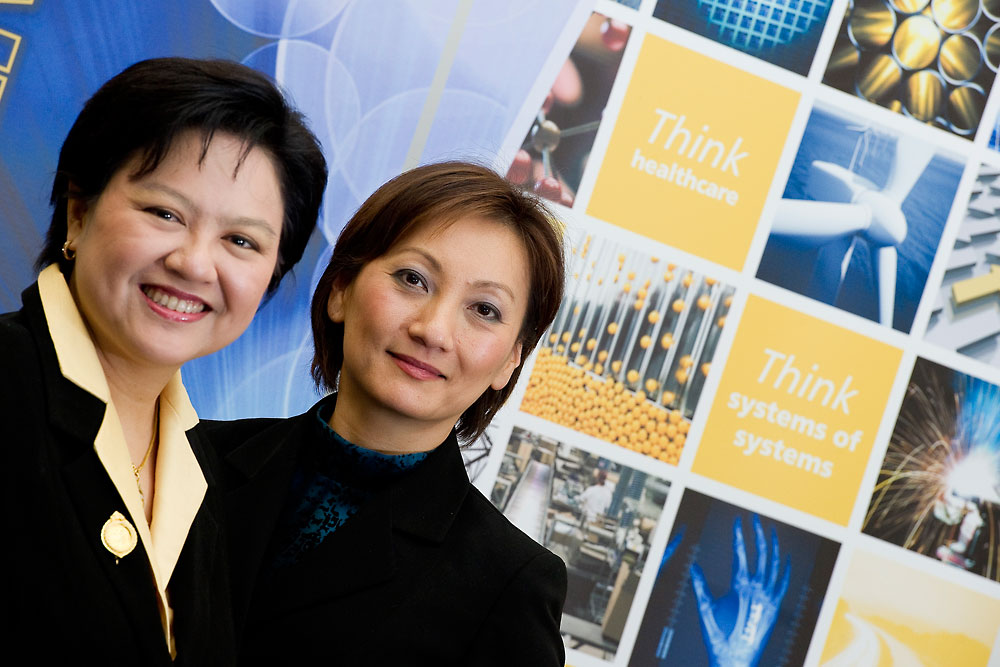Purdue's Regenstrief Center, Mayo Clinic Center for Innovation create research fellowship collaboration
Purdue's Regenstrief Center, Mayo Clinic Center for Innovation create research fellowship collaboration
| Author: | Phillip Fiorini |
|---|---|
| Magazine Section: | Innovate |
| College or School: | CoE |
| Article Type: | Article |
Upatising, a native of Bangkok, Thailand, who grew up in the shadows of the Purdue campus after she moved to West Lafayette in 1984, is in the second year of a four-year Mayo Clinic Healthcare Engineering Fellowship centered on a home-telemonitoring study of elderly patients with multiple chronic conditions.

"Mayo Clinic has always been my source for medical advice, and it was a real honor and privilege to be selected and now working as Purdue's first Mayo Clinic Healthcare Engineering Fellow," said Upatising, who is studying for her doctorate under Purdue industrial engineering professor Yuehwern Yih. "I'm excited about the role that engineering, specifically industrial engineering, can play in improving this nation's health-care system."
Through the fellowship, Upatising is part of a team of researchers analyzing data and developing predictive models from a controlled trial of telemonitoring in elderly patients, relying on technology to remotely track their medical condition. The study involves more than 200 patients at four sites of the outpatient practice of Mayo Clinic's Division of Primary Care Internal Medicine.
"We must transform the health-care delivery system in the United States to create health for individuals and populations while reducing costs," said Barbara Spurrier, administrative director of the Mayo Clinic Center for Innovation. "Our partnership gives us a unique opportunity to combine the expertise of our Mayo Clinic Center for Innovation, our new Mayo Clinic Center for the Science of Health Care Delivery and Purdue to apply systems engineering principles to achieve these goals."
Upatising, who is known as "Den," said the TeleERA study is examining the effectiveness of home telemonitoring compared with usual in-patient care. The focus is on whether telemonitoring can reduce hospitalization and emergency department visits for patients age 60 or over who suffer from multiple chronic illnesses such as diabetes, pulmonary disease and heart disease.
"Are there factors that can be used to predict when home telemonitoring, provided by the primary care practice, can increase value to older adult patients with multiple chronic illnesses, high-risk of worsening functional and medical status, and hospitalization?" Upatising says. "If so, then how can we use the knowledge to develop a decision-support tool that can assist physicians in deciding the appropriate level of care?"
Researchers also are evaluating the effectiveness of home telemonitoring for improving the quality of life, attitudes and behaviors of patients, she said. In addition, the research team is studying whether telemonitoring can help trim health-care costs by reducing 30-day rehospitalization rates and hospital bed days for this segment of the at-risk population.
"Mayo Clinic has been a strong advocate of the role of engineering in improving health-care delivery," said Steve Witz, director of the Purdue Regenstrief Center for Healthcare Engineering. "Mayo Clinic is committed to research aimed at improving primary care delivery and care coordination, and this partnership is helping Purdue advance its efforts in the health-care engineering area."
A mother of four, Upatising earned a bachelor's degree in industrial engineering from Purdue and a master's degree from the University of Michigan before working in industry for Whirlpool Corp., Accenture and Toshiba. Her career path first took her to Michigan and Ohio and then overseas to Thailand, where she employed her expertise as an industrial engineer in operations research, systems simulations and training to address manufacturing issues for appliances such as cooking ranges, washing machines and refrigerators.
While in Thailand, Upatising got her first formal taste of the health-care profession when she was commissioned to translate a book promoting breast-feeding and draft documents related to the Joint Commission International (JCI) hospital accreditation.
"I learned a lot about hospital procedures and services, and I realized it was time for me to move into a career that was more meaningful like health care," Upatising said.
That was the route Upatising followed, combining her engineering career in industry with a doctorate degree in industrial engineering from Purdue. She also is excited to be working alongside Yih, one of Purdue's first faculty fellows affiliated with the Regenstrief Center when it was launched through Discovery Park in 2005.
"Den's extensive experience as an industrial engineer working in various settings has given her a terrific insight into the benefits of applying the principles of industrial engineering to help patients battling chronic health-care challenges," Yih said. "And what a terrific opportunity this collaboration between Purdue and the Mayo Clinic offers for the Regenstrief Center and as Den works to complete her doctorate degree."
In addition to Mayo Clinic, the Regenstrief Center for Healthcare Engineering has established research partnerships with the American College of Physicians, St. Vincent Health/Ascension Health and Community Health Networks. In all, the center now is collaborating with more than 10 partners on research projects.
The Indianapolis-based Regenstrief Foundation announced plans in 2008 to invest $11 million over the next five years to expand its research partnership with the Regenstrief Center, which is Purdue's only integrated university-wide research effort in health care engineering. The center works with faculty and external partners to ensure impactful and relevant research.
Mayo Clinic is a nonprofit worldwide leader in medical care, research and education for people from all walks of life.
Comments